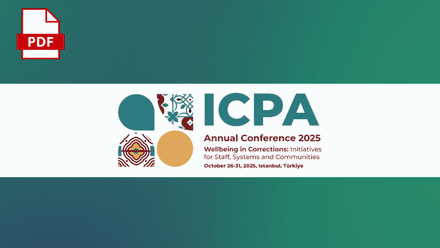Dr. Elizabeth Falcon to Share Insights and Accomplishments from Women Leaders in Corrections as it Relates to Gender-Responsive Care in Keynote Address
_______________________________
Dr. Elizabeth Falcon (PsyD, CCHP-MH, MBA) will speak at the Women in Corrections Conference (WICC), showcasing the resilience and achievements of women in corrections, while providing actionable insights for fostering gender equality and leadership in the field. Dr. Falcon will capture the essence of her leadership throughout her career recounting her progression from a novice clinician to a CEO, highlighting the gender-specific challenges she faced along the way. She will share personal stories of overcoming obstacles and breaking barriers in a predominantly male-dominated field. Anecdotes about her female role models’ pioneering role in healthcare and corrections will illustrate a legacy of elevating women in business.
Dr. Falcon will discuss the distinct challenges faced by women healthcare staff, correctional officers, and those from ethnic minorities within the correctional system. Insights into the daily realities and systemic issues that these women navigate will be provided, offering a comprehensive view of their experiences. Drawing from her extensive experience and consultations with women leaders across numerous U.S. agencies, Dr. Falcon will illuminate the key traits and best practices that define the most successful women professionals in corrections. She will delve into compelling case studies of female leadership, showcasing transformative culture and change management efforts, and illustrating powerful, effective leadership strategies that have driven significant progress in the field.
What primary insights do you hope our audience will gain from your keynote presentation?
The primary insights I hope to convey to the audience are understanding the unique psychological and social challenges faced by incarcerated women and emphasizing the importance of gender-sensitive, trauma-informed approaches to correctional mental health care. I explore strategies for implementing the Bangkok Rules, integrated healthcare and family-centred care, defining key staff training curriculums, and identifying gender-responsive practices for facility design. Additionally, I examine future innovations and the use of technology to enhance mental health services for women in the correctional system.
With over 20 years of experience in correctional and forensic psychology, what unique challenges have you observed specifically affecting women in the penitentiary system compared to their male counterparts?
Women in correctional systems face distinct challenges that call for gender-responsive approaches, including trauma-informed care, mental health support, family reunification, and comprehensive reentry planning. Their pathways to incarceration often differ from those of men, influenced by unique mental health needs, caregiving responsibilities, gender-specific healthcare concerns, and social and interpersonal dynamics. My presentation will examine and assess the effectiveness of correctional systems in meeting these essential needs.
Your work has involved developing mental health programs across numerous facilities. How do you envision adapting these programs to better align with the Bangkok Rules, particularly regarding gender-sensitive approaches to mental healthcare?
Adapting mental health programs to reflect the Bangkok Rules requires a focus on gender-sensitive, trauma-informed, and integrated (holistic) approaches. This means addressing the physical, emotional, mental, and social needs of incarcerated women, which are interconnected. This includes implementing trauma-informed care through customized therapies and incorporating support for family and social connections. Other important areas also include staff training, access to comprehensive and culturally responsive healthcare, and the use of technology to improve service delivery.
Ongoing monitoring of programs and evaluation are critical to maintaining effectiveness and alignment with the Bangkok Rules.
Given your role in training healthcare and security staff, what essential components should be included in staff training programs to ensure gender-responsive care in women's correctional facilities?
Key components of staff training for gender-responsive care include: understanding women’s health and mental health needs, and trauma-informed care; fostering trust, and promoting cultural sensitivity; respecting women’s autonomy; supporting reproductive health and mothers; addressing trauma-related behaviors; preventing sexual assault and managing use of force; and encouraging family reunification.
As someone who has implemented evidence-based models across the USA, what successful practices have you observed that specifically support women's rehabilitation and community reintegration?
The present-day, growing practice of gender-responsive and trauma-informed design in building new jails and prisons is a significant step towards creating more humane and supportive correctional environments, especially for women. Where implemented, this approach has been successful in designing spaces that promote healing, rehabilitation, and positive outcomes by supporting gender-specific concerns. For example, this practice emphasizes the importance of relational spaces to foster cooperation and trust between inmates and also staff. This approach goes beyond functionality to create spaces that promote healing, dignity, and rehabilitation. By prioritizing safety, privacy, emotional stability, and opportunities for connection, these designs not only improve the well-being of incarcerated women but also reduce recidivism and encourage successful reintegration into society. Features like open spaces, natural light, and normative furnishings contribute to a therapeutic environment that reduces stress and encourages program participation. There are funding and scaling challenges with this practice, however, as evidence of the success of this grows, I hope that this practice continues to evolve.
Looking ahead to the future, what innovations or changes do you believe are crucial for advancing women's correctional mental health care globally?
The evolution of gender-responsive and trauma-informed design in justice architecture is critically important on a global scale, as it represents a shift toward more equitable, humane, and effective correctional practices. Traditional correctional environments, designed primarily for men, fail to address women’s gender-specific needs which hinders their recovery. Gender-responsive and trauma-informed design goes beyond functionality to create spaces that promote healing, dignity, and rehabilitation. Globally, this approach can set a new standard for justice systems, encouraging culturally sensitive adaptations that address the diverse needs of women in various regions. Facility infrastructure limitations will persist as well as resistance to change, but continued evolution of these design principles is essential for building a more compassionate and humanistic justice system worldwide.
Dr. Falcon's keynote presentation promises valuable insights for correctional administrators, mental health professionals, and policymakers working to improve the outcomes of women in the criminal justice system.


